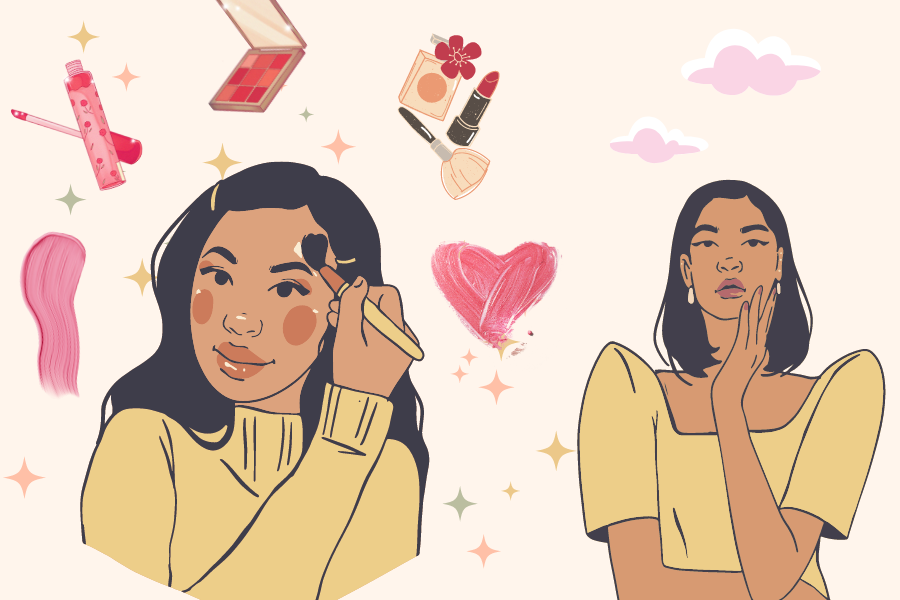First comes moisturizer, then primer, color corrector, liquid foundation, some concealer, more foundation — in powder form this time — and bronzer, finally topped off with blush, highlighter and eyeliner. Every day, the elaborate routine is hurried into a small window before the sun has risen and the bus comes.
As of 2016, 90% of girls and 69% of boys in the U.S. aged 9-17 use beauty products, ranging from makeup to facial cleaners. Teens wear makeup for many reasons, whether to boost self-confidence or to conform to the expectations of peers and social media. For those who wear it regularly, makeup can become an integral part of their life, both for better and for worse — and Whitman students are no exception to this trend.
While beauty product usage is rising, makeup has been a cultural staple since 4000 BC. Ancient Egyptians wore makeup to flaunt their wealth and protect themselves from or honor their gods. Native Americans also believed it could connect them to their god. Makeup as we know it today was popularized in the early 20th century by Hollywood’s golden age. During the 1910s and ’20s, modern film giants like MGM and Paramount Pictures were first established in Los Angeles and gained credibility with their popular silent films. To convey emotion in these silent films, men and women wore heavy, bold makeup that accentuated their features. Eye-catching makeup became associated with Hollywood glamor, leading fans to follow suit.
Beyond the silver screen, many women donned darker shades of makeup to appear more “exotic” after beauty companies began marketing darker shades to match the ethnic diversity of America at the time. The shift in attitude was parallel with changing perceptions of tans. Before the ’20s, being tan was a sign a woman was working-class and labored outdoors. During the 1920s and ’30s, however, tans became associated with the leisurely outdoor time of the wealthy. Regardless of the reason, companies advertised cosmetics as a temporary mask, worn until customers wanted to return to normal.
Makeup provides an opportunity to experiment with new identities, a compelling reason to try it. For junior Rihanna Arouna, makeup allows her to try out different looks, she said. Changing styles with little long-term consequences can be exciting, making schooldays that would otherwise blend more interesting.
“I enjoy wearing makeup because it allows me to have control over my appearance and self-expression,” Arouna said. “It allows you to try different styles and see if you like them.”
However, some take appearance transformations to an extreme, entirely transforming their skin shades. Nearly 11% of American teenagers have used tanning lotion or received a spray tan. Part of the appeal of skin darkening comes from the fact that it is a semi-permanent procedure, unlike its opposite, skin lightening. Prevalent in Southeast Asian countries and communities, lightning often stems from deep-rooted beauty standards. Studies estimate that one in two Filipino women use skin-lightening products, believing that lighter skin will afford them more economic options and social acceptance. Similar patterns have emerged across the globe, with Middle Eastern, South American, African and North American people increasingly turning to skin lightening to build self-esteem and attain a higher social standing.
Although widespread, skin lightening is damaging to both physical and mental health. Research finds that popular skin-bleaching agents like hydroquinone and kojic acid lead to cancer and general skin damage. The association of light skin and beauty can be mentally damaging, as it assigns value to a nearly unchangeable characteristic.
Sometimes, families perpetuate beauty and skin expectations imposed by society. Junior Molly’s mother immigrated to the U.S. from China in 2000, bringing subconscious beauty standards with her, she said.
“She’s always like ‘You need to look lighter,’” Molly said. “She doesn’t really tell me often, but I definitely feel it with how she always wears full-on coverage when she goes out of the house.”
Other Asian beauty norms continue to impact the lives of Whitman students. In South Korea, K-beauty — the look associated with Korean actors and actresses, celebrities and pop stars — pressures people to have flawless skin, thin bodies and a youthful look. Such unrealistic expectations fuel the makeup and plastic surgery industry worldwide, designating South Korea as the “plastic surgery capital of the world.” Despite this, K-beauty culture has had some positive effects. The widespread use of makeup has led to the creation of many affordable and effective Korean cosmetics that are becoming increasingly popular in America.
Junior Zaynab Ahmed began wearing Korean makeup after her friends introduced her to several products. Not only was the packaging better, but the products were higher quality than other popular American cosmetics, she said. However, the minimal array of skin shades offered was an issue.
“I can’t use a lot of their skin products because their shade range is just for very pale Koreans,” Ahmed said. “They make it just for Korean skin tones, and even Koreans don’t have some of those skin tones.”
In the cosmetics industry, companies market makeup products to a younger demographic. In 2011, Pinkstinks, an organization against advertising makeup towards children, found that in the U.S., girls between the ages of 8 and 12 are the largest growing cosmetics market, spending over $40 million each month on cosmetics. In recent years, entrepreneurs have created makeup brands targeted toward toddlers, justifying their products by asserting that they are only for fun. However, using makeup at such a young age can be dangerous.
Companies typically design cosmetic products with teenage and adult skin in mind. When children use these products, the active ingredients can be too harsh for their sensitive skin, leading to allergic reactions. Researchers found that some makeup products in children’s toys contain asbestos, cadmium, formaldehyde, lead and phthalates, which can cause skin damage after frequent exposure. Even cosmetics marketed as “natural” or “non-toxic” may still be dangerous, as the U.S. Food and Drug Administration hasn’t defined these terms for makeup. Whether the makeup is seemingly safe, long-term usage can still be harmful. Ahmed had to modify her makeup routine because it was negatively affecting her health, she said.
“The middle of freshman year, I started wearing mascara every day,” Ahmed said. “I stopped wearing mascara this year because my lashes kept falling out.”
Despite various drawbacks, children, teens and adults continue to wear makeup regularly. For many, makeup is a confidence booster, allowing the wearer to accentuate facial features and cover up imperfections like acne and discoloration. Although this could be interpreted as a superficial benefit, low self-esteem in students can lead to less engagement with educational materials and willingness to take risks. Students with increased confidence can focus less on appearance or judgment and more on their responsibilities. Deviating from a routine of wearing makeup can also disrupt school performance, junior Sadie Bastianelli said.
“I definitely feel more confident when I have makeup on. I just feel more put together than when I don’t,” Bastianelli said. “Sometimes, I’m rushing to school and I don’t have time to put on my makeup. I feel like I’m rushed all day.”
In the end, users’ intentions determine the potential benefits or drawbacks of cosmetics. While the initial decision to wear makeup may stem from societal pressure or self-doubts, people can easily change their mindset. Bastianelli initially focused on makeup to hide certain insecurities but has since changed her perception, she said.
“I’ve become more confident in myself and self-secure,” Bastianelli said. “I don’t use it like that anymore. As long as you grow from it and you learn to accept yourself the way you are, it’s not too big of a deal.”


















